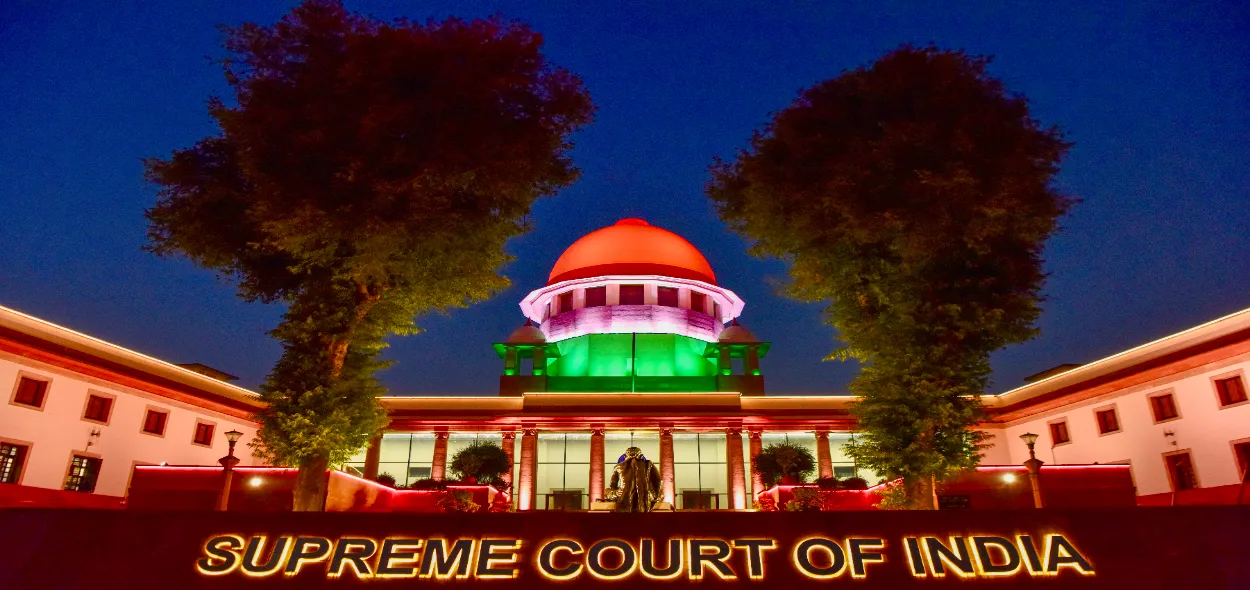
New Delhi
The Supreme Court on Wednesday proposed to pass an interim order in the batch of petitions challenging the constitutionality of the Waqf (Amendment) Act, 2025. The three-judge bench led by Chief Justice Sanjiv Khanna, along with Justices Sanjay Kumar and KV Viswanathan, indicated that it would pass an order that aims to "balance equities" while safeguarding waqf properties previously upheld by judicial pronouncements.
According to both Live Law and Bar & Bench, the top court has hinted at passing interim directions — which include:
Court-declared waqf properties: Any property declared as waqf by a court — whether by waqf-by-user or by deed — shall not be de-notified or treated as non-waqf while the challenge to the amendment is being heard.
Suspension of Section 2A proviso: The proviso to Section 2A, which excludes a property from waqf status during an inquiry by the collector into its status as government land, will not be given effect to.
Religious composition of waqf boards: All members of the Central Waqf Council and state waqf boards, excluding ex-officio members, must be Muslims.
The court will hear the matter further tomorrow at 2 PM to finalise the interim relief.
Chief Justice Khanna emphasised that the order is designed to ensure fairness. “Whichever properties were declared by court to be waqf will not be denotified or be treated as non-waqf... whether it is waqf-by-user or not. Collector can continue with proceedings... but the proviso will not be given effect to.”
Arguments before the court
Appearing for several petitioners, including MPs Asaduddin Owaisi and Manoj Jha, and religious organisations such as Jamiat Ulema-i-Hind and Samastha Kerala Jamiatul Ulema, a battery of senior advocates — Kapil Sibal, AM Singhvi, Rajeev Dhavan, CU Singh, Sanjay Hegde, P Wilson and others — raised extensive constitutional and religious concerns.
Violation of Article 26 (Freedom to manage religious affairs): Kapil Sibal called the amendments a "parliamentary usurpation of the faith of 200 million persons", especially criticising the requirement under Section 3(r) that a person must demonstrate five years of practicing Islam to create a waqf.
“If I am born a Muslim, why must I prove my faith to the State? Who is the State to decide how good or bad a Muslim I am?” he asked.
Abolition of waqf-by-user: Senior Advocate Abhishek Manu Singhvi called the deletion “dangerous”, pointing out that nearly 4 lakh out of 8 lakh waqf properties exist by user custom. “With one stroke of the pen, centuries of tradition have been undone,” he argued.
Collector as arbitrator of disputes: Sibal and CU Singh attacked the provision allowing the Collector to determine if a property is waqf or government land, calling it unconstitutional.
“A government officer cannot be a judge in his own cause,” they submitted.
Deed mandate for waqf creation: Sibal criticised the requirement for a waqf deed, arguing that many waqf properties are centuries old and have no written documentation.
“They will now ask for waqf deeds from the 14th century,” he said.
Inclusion of non-Muslims in waqf boards: The inclusion of non-Muslim members in the central and state waqf boards was vehemently opposed as violating Article 26.
Justice Kumar observed: “Proviso doesn’t limit it to just 2 non-Muslims.” To which Solicitor General Tushar Mehta, representing the Union government, offered to submit an affidavit affirming a cap of two non-Muslim members.
Government's defence
SG Mehta defended the Act, stating that it was the outcome of an elaborate Joint Parliamentary Committee (JPC) process involving 38 sittings and over 98 lakh public memoranda.
“The law does not invalidate all waqf-by-user, and if registered, they would continue to enjoy waqf status. The Collector's role in dispute resolution does not prevent judicial review, as aggrieved parties can approach Waqf Tribunals or writ courts. The amendment intends to streamline waqf administration and prevent misuse of waqf status,” he clarified.
On the controversial Section 2A proviso, Mehta said, “Ignore that part,” suggesting an openness to clarification.
However, CJI Khanna pushed back: “This will be undoing something established by law. Many waqf properties were created before the British came. You cannot ask for a registered deed now.”
Courtroom exchanges
Throughout the nearly two-hour hearing, the bench raised multiple concerns:
Can the legislature override judgments that declare properties to be waqf?
Is it constitutionally valid to dilute religious autonomy through board compositions?
How will centuries-old waqf properties without documentation prove legitimacy?
ALSO READ: Taufiq Mohammad who saved lives during 26/11, says hang Rana
CJI Khanna rebuked SG Mehta for suggesting that judges' own religious identities were relevant to the issue: “When we sit here, we lose our religion. This is not about judges; it is about religious boards.”
Over 70 petitions have been filed challenging various provisions of the 2025 Act and one challenges the Waqf Act, 1995 itself. BJP-ruled States — Haryana, Assam, Rajasthan, Chhattisgarh, Uttarakhand and Maharashtra — have moved intervention applications in support of the law.
